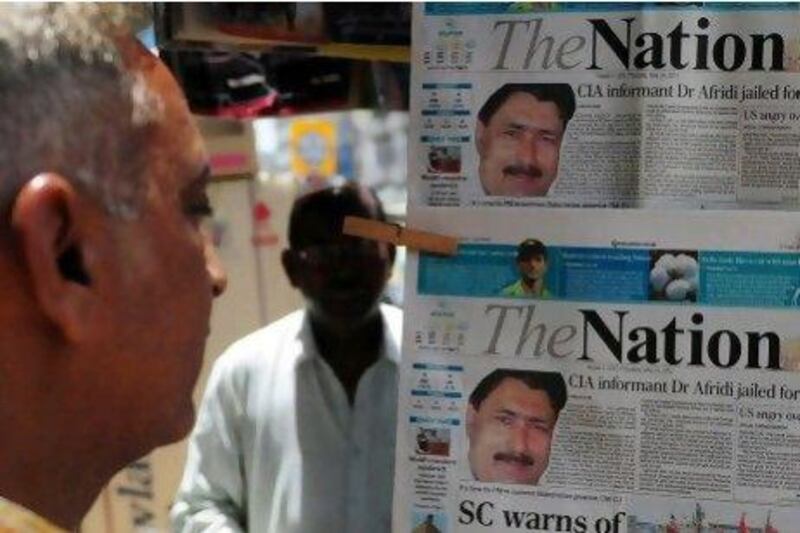ISLAMABAD // Pakistan said yesterday that its courts should decide the fate of its citizens after the United States condemned a Pakistani court's decision to jail a doctor who helped the CIA track down Osama bin Laden.
A tribal court in Pakistan convicted Shakil Afridi on Wednesday of conspiring against the state and sentenced him to 33 years in prison. He had worked with the US by running a fake vaccination campaign to collect DNA that helped verify the Al Qaeda leader's presence in Abbottabad.
This information helped US forces launch their raid on bin Laden's hideout last year.
US officials were highly critical of the sentencing.
Leon Panetta, the US defence secretary, who as CIA director oversaw the raid, said in an interview aired on CBS Evening News on Wednesday that Afridi was "very helpful" with the operation and described his jail term as a "mistake".
"For them to take this kind of action against somebody who was helping to go after terrorism, I just think is a real mistake on their part," he said.
George Little, a Pentagon spokesman, said anyone who helped the US find bin Laden was "working against Al Qaeda and not against Pakistan".
But Pakistan said Afridi's conviction was in line with its legal procedures.
"As far as Mr Afridi's case is concerned, it would be decided in accordance with Pakistani laws and in Pakistani courts," Moazzam Ali Khan, the foreign ministry spokesman, told reporters.
US officials had called on Pakistan to release Afridi, who comes from the Khyber tribal region on the Afghan border. He was arrested by Pakistani security agencies shortly after bin Laden's death when he was reportedly trying to escape.
The tribal court in Khyber on Wednesday handed down a jail term and imposed a fine of 320,000 Pakistani rupees [Dh12,800]. Afridi can appeal the sentence.
Pakistani tribal officials said Afridi had confessed to the charges during the trial, which was held behind closed doors. However, some media reports suggest that he was not present during the proceedings.
Under British-era Frontier Crimes Regulations (FCR), the government-appointed administrative head of the tribal region adjucates in criminal proceedings and gives swift decisions.
However, unlike ordinary Pakistani penal law, the FCR does not carry the death penalty for treason. If convicted under Pakistani penal law, Afridi almost certainly would have received the death penalty, according to Pakistani legal experts.
Afridi's jail term has increased tensions between the US and Pakistan. Pakistan says the US raid violated its sovereignty and embarrassed its military.
Yesterday, Mr Khan also "strongly condemned" US drone strikes in Pakistani border regions. In the latest such strike, four suspected militants were killed in the North Waziristan tribal region on Wednesday.
foreign.desk@thenational.ae





